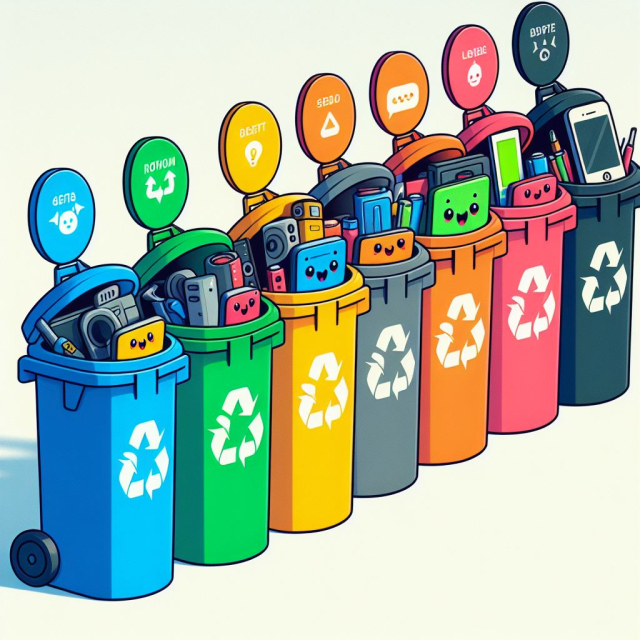The rapid advancement of technology has brought a significant increase in the amount of electronic waste (e-waste) globally. Ecuador is no exception to this trend, facing the challenge of properly managing waste from obsolete or disused electronic devices. This article analyzes how e-waste is managed in Ecuador, the associated challenges, and the solutions implemented to mitigate its environmental and public health effects.
The Magnitude of the Problem.
The production of electronic waste in Ecuador has increased considerably in the last decade, driven by the growing penetration of electronic devices in homes and businesses. According to data from the National Institute of Statistics and Censuses (INEC), in 2020, each Ecuadorian generated approximately 7 kilograms of electronic waste, which represents a significant increase compared to previous years.
Types of Electronic Waste.
E-waste comprises a wide range of products, including:
- IT and telecommunications devices: computers, mobile phones, tablets.
- Large and small appliances: refrigerators, washing machines, microwaves, vacuum cleaners.
- Consumer equipment: televisions, cameras, audio equipment.
- Electrical and electronic tools: drills, electric saws.
- Toys and electronic sports equipment.
These devices contain hazardous materials such as lead, mercury, cadmium and brominated flame retardants, which can cause serious health problems and environmental pollution if not managed properly.
Challenges in Electronic Waste Management.
E-waste management in Ecuador faces several challenges, including the lack of adequate infrastructure, low public awareness, and limited specific legislation.
Infrastructure and Logistics.
Ecuador lacks robust infrastructure for the collection and recycling of electronic waste. Recycling facilities are scarce and mainly concentrated in major cities such as Quito and Guayaquil, making access to recycling services difficult for rural communities and small towns.
Awareness and Education.
Lack of awareness and education about the dangers of e-waste and the importance of recycling is another major challenge. Many citizens are not familiar with proper practices for disposing of their electronic devices, resulting in improper disposal in landfills or sale to informal recyclers.
Legislation and Regulation.
Although Ecuador has adopted some regulations for the management of hazardous waste, specific legislation for electronic waste is limited. The lack of clear and strict regulations makes it difficult to implement effective collection and recycling systems.
Solutions Implemented and in Process.
Despite the challenges, Ecuador has taken several measures to improve e-waste management. These initiatives include government programs, public-private partnerships, and non-governmental organization projects.
Government Programs.
The Ministry of Environment and Water of Ecuador has implemented programs and policies to promote the proper management of electronic waste. One of the most notable efforts is the creation of the National Hazardous Waste Management System, which includes e-waste.
Recycling and Reuse.
The government has promoted the creation of collection and recycling centers where citizens can deposit their unused electronic devices. These centers are equipped to dismantle devices, recover valuable materials, and safely dispose of hazardous components.
Public-Private Partnerships.
Public-private partnerships have played a crucial role in e-waste management in Ecuador. Technology and recycling companies have collaborated with the government to establish collection and recycling programs.
Business Initiatives.
Several technology companies, such as Samsung and HP, have launched recycling campaigns that allow consumers to return their old devices to designated collection points. These companies then take care of the recycling and proper management of electronic waste.
NGO and Community Projects.
Non-governmental organizations (NGOs) and community initiatives have also contributed significantly to e-waste management in Ecuador. Projects such as "Ecolec" and "Inclusive Recycling" work to raise awareness among the population about the importance of electronics recycling and train informal recyclers.
Education and Awareness.
These organizations carry out education and awareness campaigns in schools, communities and companies, promoting sustainable and responsible practices for the management of electronic devices. They also focus on the inclusion of informal recyclers in the formal recycling system, providing them with the training and tools necessary to carry out their work safely and efficiently.
The Future of Electronic Waste Management in Ecuador.
The future of electronic waste management in Ecuador depends on continued collaboration between government, businesses, NGOs and civil society. Concerted efforts are needed to improve infrastructure, increase public awareness and strengthen regulations.
Infrastructure Improvements.
The development of more recycling and collection centers throughout the country is essential to facilitate access to electronic waste recycling. This includes not only the creation of new facilities, but also the modernization of existing ones to handle the growing volume of e-waste efficiently.
Promotion of the Circular Economy.
Promoting a circular economy, where electronic products are designed to be easily recycled and reused, is crucial. This involves encouraging manufacturers to produce more durable and recyclable devices, and consumers to adopt more sustainable consumption practices.
Strengthening Legislation.
The implementation and strengthening of specific laws for the management of electronic waste are necessary to ensure proper management of this waste. This includes establishing clear responsibilities for manufacturers, distributors and consumers in the life cycle of electronic products.
Education and Citizen Participation.
Continuing education and citizen participation are key to the success of any e-waste management program. Educational campaigns must be permanent and aimed at all ages, promoting a culture of recycling and environmental responsibility.
E-waste management in Ecuador faces significant challenges, but significant efforts have also been made to address the problem. Through collaboration between the government, companies, NGOs and the community, various solutions have been implemented to improve the management of this waste. However, there is still much to be done to ensure that Ecuador manages its e-waste sustainably and efficiently, thereby protecting public health and the environment. With continued focus on improving infrastructure, education and legislation, Ecuador can move towards more effective and responsible e-waste management.
